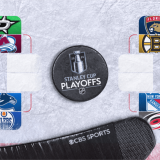
More NHL Offseason: NHL rumors | Rumor mill | Trade Tracker | 2014-15 preseason odds
The NHL is finding itself waist deep in litigation it seems lately. With a number of lawsuits piling up from former players related to brain injuries, the league is also still dealing with a lawsuit filed two years ago by a group of fans. Those fans will have their case heard after a judge dismissed the NHL’s motion to have the suit dismissed. That decision was unsealed Friday.
The suit filed by six fans of the league allege that the NHL and Major League Baseball’s restrictions on local TV broadcasts are anti-competitive. According to Rick Westhead of TSN.ca, the trial is expected to proceed early in 2015.
In a lawsuit filed in New York two years ago, a group of disgruntled fans claimed that the restrictions on broadcasting were inappropriately driving up the price of sports cable television packages.
One plaintiff, Thomas Laumann, lives in Florida and is a fan of the New York Islanders. Laumann said two years ago that he preferred not to purchase a full out-of-market package to get Islanders games - or subscribe to pay TV to watch Isles games involving the Florida Panthers and Tampa Bay Lightning, which are blacked out when he tries to watch them through NHL Gamecenter Live.
The lawsuit also attacks the NHL's tactic of charging customers $179.80 for its full-season offering of games available on cable and satellite providers. Again, both of those packages, known as NHL Center Ice, black out in-market games.
The NHL subsequently filed a motion to dismiss the case and a judge ruled this week against that motion. The ruling was unsealed on Friday.
Before this gets to trial, the lawyers for the plaintiffs will ask for the case to be considered a class action suit. If approved, that would make every U.S.-based customer of the NHL’s Center Ice package eligible to be included as a plaintiff.
This has a chance at being a very big problem for the league.
The motion to dismiss was denied by Shira Scheindlin, a federal judge in New York, according to the New York Times.
Scheindlin said a trial would help show whether the leagues were accurate in claiming the restrictions were good for the sports and their fans.
The initial court filings, which Westhead wrote about while with the Toronto Star at the time the suit was filed, also took aim at the blackouts of games streamed over the internet in their local markets.
From the Star’s initial report in 2012:
“No one in New York,” the court filings say, “has access to any live presentation of a contest involving the Rangers over the Internet, despite the fact that Rangers’ contests are routinely streamed over the Internet to consumers elsewhere. . . . The sole reason for this restriction is to interfere with competition.”
By restricting more widely available game telecasts, the league “is able to charge monopoly pricing and limit the choices available to consumers.”
The restrictions amount to a breach of U.S. antitrust law, charges the lawsuit, filed in U.S. District Court for the Southern District of New York. Maple Leaf Sports & Entertainment, which owns the Maple Leafs, is listed as a defendant, as are the NHL’s other 29 clubs.
The blackouts have long been a point of contention among fans when it comes to GameCenter Live, in particular. They are of course designed to protect the ratings of the network that owns the TV rights for the local team, but the consumer is often a big loser in that scenario.
It’s not just for teams in their home markets. For instance, in Iowa (where I got to find this out for myself the hard way), a fan who purchases the GCL package is likely to have games blacked out for each of the Chicago Blackhawks, Minnesota Wild and St. Louis Blues, whether that individual’s cable provider carries the networks that those teams are on or not. That’s a loss of a significant amount of games despite the cost associated with the service for the consumer.
What will make this trial even more interesting to follow is how it would impact each individual team’s flexibility in controlling their own broadcasting rights outside of their local market.
The NHL has prevented its teams from selling their TV rights outside of teh local markets since 1985 according to Rick Westhead.
There’s still a lot to sort out, but if this lawsuit is successful, it would likely allow NHL teams to pursue selling their rights in other markets to reach wider fan bases, bypassing the somewhat restrictive Center Ice and GameCenter Live packages.
The question for the individual teams is if they would be able to find a market for selling their rights beyond the boundaries of their local market. Surely, not every team would, but most owners probably wouldn’t mind finding another revenue stream that they can solely control.
Bill Daly, the NHL’s deputy commissioner, told TSN.ca that the NHL remains “confident of ultimately prevailing on the merits,” despite losing the motion to dismiss the case.
This is certainly a complex case that is going to take a while to get sorted out, including whether or not the leagues are actually violating antitrust laws, but the fact that the fans and their lawyers provided enough evidence to prevent the NHL from having the case dismissed is a good start for the plaintiffs. There’s a lot left to prove, but depending on how this plays out, it could have a seismic impact on the status quo for U.S. television rights in professional sports.





















